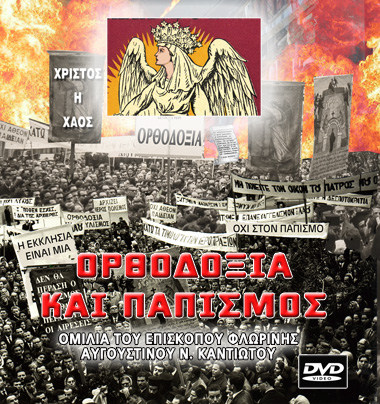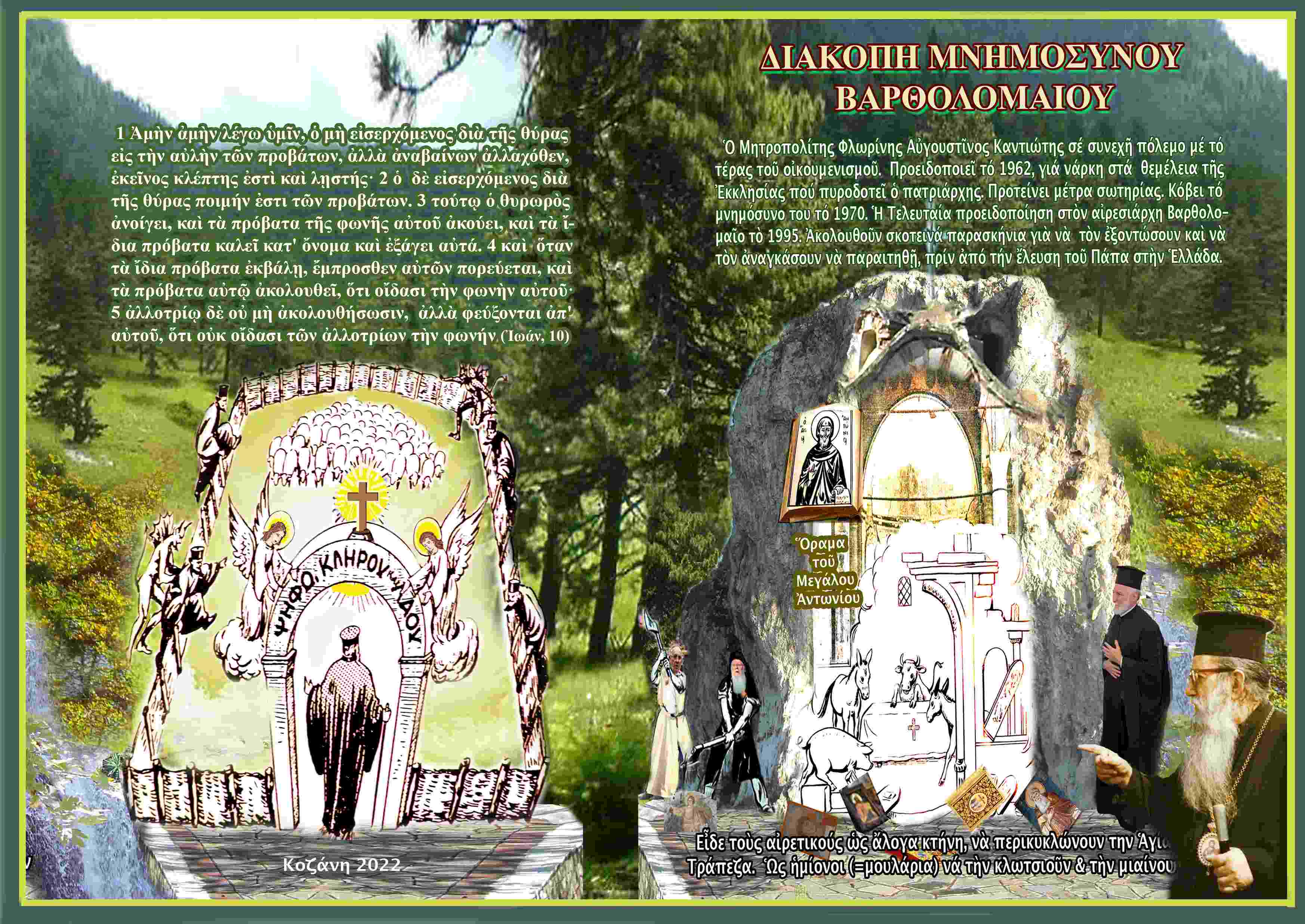WHAT IS PAPISM?
 Ιούλ 31st, 2010 |
Ιούλ 31st, 2010 |  Filed under: English
Filed under: English
WHAT IS PAPISM?
(TI EINAI ΠΑΠΙΣΜΟΣ)
 Without reservation we say that papism is a toppling of the fundamental laws of the Church, of genuine Christianity. And behold why.
Without reservation we say that papism is a toppling of the fundamental laws of the Church, of genuine Christianity. And behold why.
According to Scriptures, the root, head, and foundation upon which the entire Christian edifice is supported is the God-man Redeemer, our Lord Jesus Christ. He is the Alpha and the Omega of our faith, of our hope and of our love. He is the Leader. The voice of the Father heard twice from heaven, at the Jordan river and on Mount Tabor, established Him as eternal Leader in the Church: “This is my beloved Son, in whom I am well decided; listen to him” (Matt. 3:17; 17:5). The faith in Christ, the active faith, which is exhibited through absolute obedience to his commandments, even the least of them, is a fundamental law of the Church. Without this faith the Church can not be conceived.
Moreover, a fundamental law in the Church, which the God-man Lord established, is: as often and whenever among the faithful there appear serious disagreements concerning things of the faith, things that need to be done, worship matters – these differences are not solved by one only member of the Church, however official is his position, holiness and wisdom might be; but these matters are solved by the collective whole, by the Church, coming together and convening in holy Spirit (Matt. 18:17). According to this manner, that argument concerning circumcision, which shook up the apostolic Church, was solved, during which both Peter and Paul and the rest of the apostles and disciples spoke and developed their views on the subject; but when the decision was made, all subjected themselves to the voice of the Church (Acts 15:6-29). No one of them set his own authority above the authority of the Church. The infallible criterion in the Church, even when the chiefs of the apostles were living, was the Synod (Council).
But both of these fundamental laws, which pertain to the administration of the Church, papism overturned. In the Church the leader is the pope. In the Church the pope possesses infallibility. In the Church the pope is everything. Being driven by the demon of luciferian pride the pope usurped all the authorities, set his throne above the clouds, opened his mouth and, as another Nebucadnezzer, said: Nations and peoples, do you see me? Fall down and worship, pay homage to me. “By divine right” I am above lay people, monastics, deacons, priests, bishops, metropolitans, archbishops, patriarchs, regional and even those ecumenical Synods. When I am found on my seat and speak, I speak in holy Spirit and my decisions are infallible. I am the one and only, unique referee of Christ upon the earth. The soldiers who are faithful to me preach to the whole world the motto:
“Just as one God exists, one sun for the day, one moon for the night, in like manner God gave to the Church only one leader, the pope.” But not only ecclesiastical, but also political leaders obligated to obey me in all things. The two swords in the Gospel (Luke 22:38) symbolize the spiritual and worldly authority, and I must hold and use these two swords. Every authority comes from me. Woe unto the one who set himself against my volitions…
The pope, being clad with such ideas, established in the world a tyranny, a tyranny in the name of the Crucified One, whom he would say, that he and only he would represent upon the earth. And this tyranny ended up being unbearable, especially when upon the papal throne there sat individuals, who had no internal relation with the Christian faith and life. Popes thieves and robbers, making unrestrained use of power, brought huge corruption to the flocks of the West. The people murmured. The godly would sigh. Courageous preachers of the divine word, who dared to protest against the antichristian live and conduct of the popes, were apprehended and burnt alive, as the famous Jerome Savonarola (1452-1498), whose statue adorns today one of the squares of Florentia. Rome, with the corrupt and unfaithful popes, who abolished every evangelical virtue, would appear already in the eyes of the peoples of the West as the whore of the seas, as the new Babylon. Finally the volcano of the wrath of the peoples erupted. In 1520 a revolution was preached and the strong struggle against the papists began. At the head of the struggle was Martin Luther, concerning whom Thomas Carlyle writes, that Luther took the ax of truth and with the surge of a hero attacked and crushed the idol of papism. The struggle lasted many decades. The civil war was raging. Blossoming cities were transformed into smoking ruins. The blood ran like a river. And the cause, the most serious of all, of that big disaster, which struck Europe, was the foolish, the antichristian ambition of the pope, so that all might fall down and embrace the edge of his foot and recognize him as the only leader of the Church upon the earth.
The popes, if they had even an ounce of real godliness or true piety, would be ashamed in projecting such foolish and antichristian ambitions, and, the worst of all, struggling for the enforcement of them upon the totality of Christianity. He who studies the history of this period oftentimes remembers J. Chrysostom, who, lamenting on account of the bad situations of the ecclesiastical divisions would preach, that the chiefest cause of them is the controlling-spirit, philarchia.
“Nothing is capable of dividing the Church thusly as the controlling-spirit, nothing thus kindles the wrath of God as the dividing of the Church” (See 11th homily on his commentary on the epistle to the Ephesians: P.G 62.85).
+ Archimandrite Augustinos Kantiotes, 1956



Σεπτέμβριος 21st, 2010 at 4:13 μμ
[…] Source […]
Add A Comment
You must be logged in to post a comment.